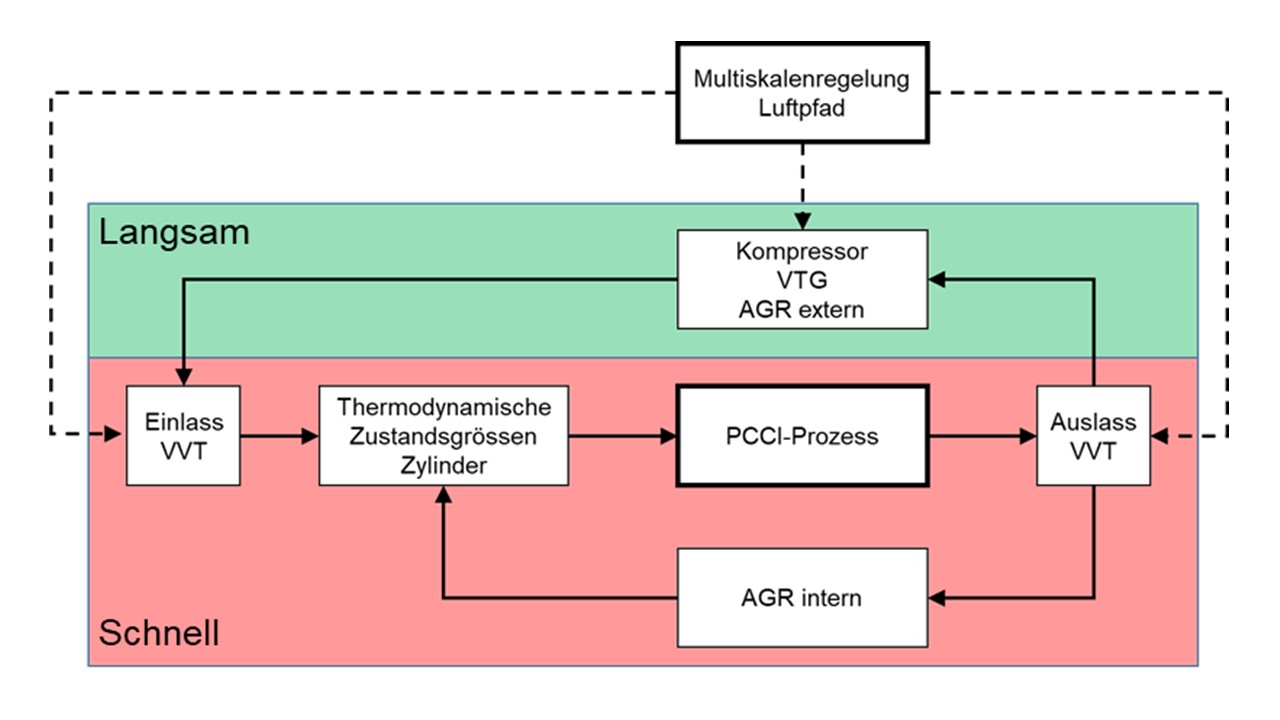FOR 2401
external page FOR 2401 is a research project financed by the external page German research foundation and focuses on the feedback control of low temperature combustion. The research project is carried out in collaboration with three German partner universities. At ETH Zurich, we will look into the benefit of a new type of variable valve train for premixed charge compression ignition, or shortly PCCI.
Policy makers have set external page ambitious goals to further increase the thermal efficiency of internal combustion engines, since they are still an important technology for heavy-duty applications.
A possible approach to further improve compression-ignited engines is PCCI-combustion. This type of combustion shows great potential in further increasing thermal efficiency while at the same time lower engine-out pollutant emissions.
In contrast to conventional compression-ignited engines, the PCCI-process has a high sensitivity to the initial conditions in each cylinder. Feedforward control is no longer sufficient to ensure a stable combustion and hence feedback control of the combustion and air path is required. The controller must obtain an appropriate control signal for each engine cycle based on the cylinder-pressure of the previous cycle. This requires extremely fast computing times and is a difficult task due to the already existing complexity of the engine.

Using a external page novel type of variable valve train (VVT), a compression-ignited engine can take advantage of additional degrees of freedom in providing the desired initial conditions for each cylinder. The valve timings have to be coordinated with the existing air path and combustion control. The VVT enables a fast control action for each cylinder in a multi-cylinder engine, which to date is still a challenge for PCCI operation.
The knowledge gained from this research project is manifold. Firstly, the variable valve train can further improve the fuel consumption of conventional Diesel engines. Secondly, the valve train enables large control of the sensitive PCCI-combustion. Thirdly, the control system in combination with the novel valve train will be used to develop concepts for combustion control, with which the combustion process can be greatly influenced. This creates the possibility to consider the fuel as a further degree of freedom. With regard to the increasing use of regenerative fuels, the ability of an engine to adapt to different types of fuel and to burn them as efficiently as possible is of utmost interest.
Giordano Moretto, Nicolas Schnell, Jonathan Frey, Yasin Karakaya, Alois Amstutz, Moritz Diehl, Tina Kasper, Christopher Onder
external page Fast model-based calibration of multiple injections for a CI engine using nonlinear optimal control - CEP 2024
Giordano Moretto, Severin Hänggi, Christopher Onder
external page A method to quantify the advantages of a variable valve train for CI engines - IJER 2023
Giordano Moretto, Severin Hänggi, Christopher Onder
external page Optimal Combustion Calibration for Direct Injection Compression Ignition Engines using Multiple Injections - IJER 2022
Severin Hänggi, Giordano Moretto, Thivaharan Albin, Christopher Onder
external page The potential of heat release rate and cylinder pressure feedback control for conventional and premixed charge compression ignition combustion - IJER 2020
Jan Schilliger, Nils Keller, Severin Hänggi, Thivaharan Albin
external page Data-based Modeling for the Crank Angle Resolved CI Combustion Process - Springer 2020
Giordano Moretto, Severin Hänggi, Thivaharan Albin, Christopher Onder
external page Combustion Rate Shaping for Cycle-to-cycle Control - SCC 2019